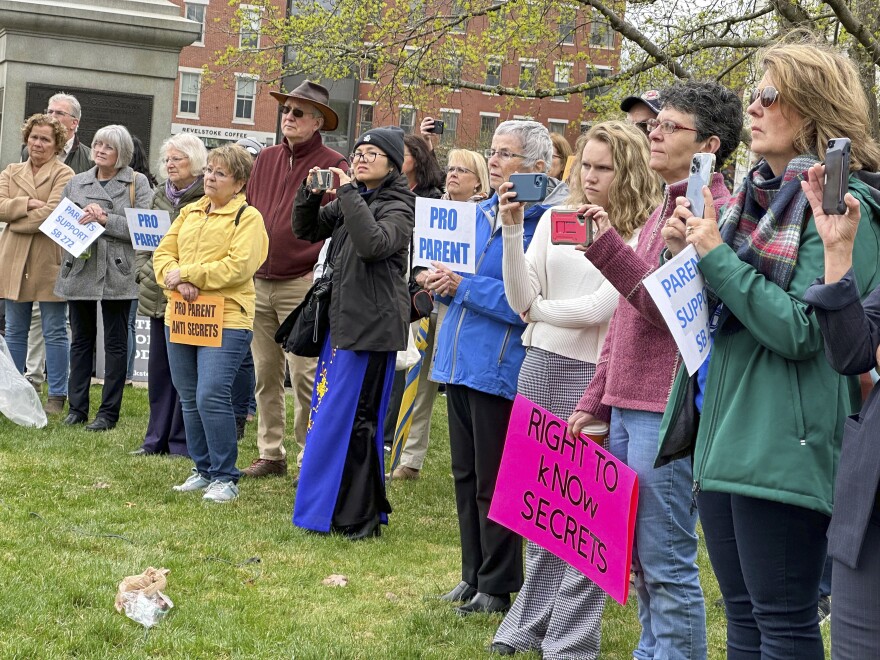The New Hampshire Supreme Court heard arguments Thursday in a case brought by a Manchester parent challenging school policies around transgender and nonbinary students.
The parent says she was kept in the dark when her child began using a different name and identifying as a different gender at school — something the parent objected to.
The case is part of a broader fight over the rights of transgender and gender nonconforming students playing out in New Hampshire. Republican lawmakers are rallying behind legislation that would force schools to disclose a student’s gender identity to parents when asked. The House narrowly rejected one such proposal last month, but another remains on the table after passing the Senate along party lines.
In court this week, attorney Richard Lehmann told the justices that parents have a fundamental, constitutional right to raise their children as they see fit. Lehmann, who is also the longtime legal counsel for Republicans in the state Senate, said that extends to knowing whether their child is socially transitioning at school.
“Parental input into that kind of decision matters,” he said.
At issue is a district policy that says Manchester school staff generally shouldn’t disclose when a student identifies as transgender or gender nonconforming, without that student’s permission.
A lawyer for the school district, Meghan Glynn, said it’s about creating a safe, supportive environment for those students and not forcibly outing them to their families. She said that does not infringe on a parent’s constitutional rights.
“Parents can have conversations with their child, they can monitor their social media, they can monitor their friend group,” she said. “And again, they are doing that exclusively for 80% of the week,” she added, when the child is not in school.
Glynn said parents can choose to send their child to a different school if they dislike the district’s policies, or they can make their voices heard at school board meetings.
But ruling that the state constitution requires schools to report on changes to students’ gender identity would, Glynn said, “extend a fundamental right beyond that which any court has done in the United States thus far.”
Last year, a lower court judge sided with the school district and dismissed the lawsuit, saying Manchester's policy did not violate the parent’s rights. The parent, who filed suit anonymously to protect her child’s privacy, is appealing that order.

Justices pressed lawyers for both sides as they made their cases Thursday.
At the outset, Lehmann framed the question as whether parents must be informed about how the school itself is handling their child’s stated gender identity — not simply what their child is doing.
“This is not a case about outing a student because of the way a student acts in school,” he said. “It’s not a case of outing a student who has a private conversation with an individual faculty. ”
“How can you avoid those pitfalls?” Associate Justice Gary Hicks interrupted.
Lehmann said he is asking for a “narrow ruling” that won’t answer every conceivable question, but argued the Manchester School District is “usurping the parental role of determining the very identity of her child.”
“The school is not deciding what gender the child should be referred to,” Associate Justice Patrick Donovan said. “The school just has a policy about how they’re going to communicate that information.”
“Well, the school is deferring to the wishes of a child,” Lehmann responded.
Later, Chief Justice Gordon MacDonald pressed Glynn, the school district lawyer, on whether parents had the right to ensure their child’s safety and emotional well-being — and whether they should therefore be able to know their child’s gender identity, given that transgender and nonbinary youth struggle with mental health challenges at higher rates.
“Do you dispute [the statement] that trans youth are under heightened risk for suicide and mental health issues?” the chief justice asked, noting that this issue was raised in the parent’s legal complaint.
“No, we certainly do not,” Glynn answered. “Which is why it is all the more imperative that students who are not comfortable immediately having these conversations with their families have a safe place to go at school.”
Glynn added that parents can still learn that information by talking directly to their child.
“They are just not getting that direct confirmation from the school,” she said.
Chris Erchull, an attorney with GLBTQ Legal Advocates and Defenders attended the arguments. He said afterward that the case could determine whether schools can create a safe, supportive environment for transgender and gender nonconforming students who aren’t out to their families yet.
“The primary concern is that LGBTQ students who are attending public schools will not feel like they have trusted adults in the school environment, that they won't have somebody that they can talk to,” he said.








